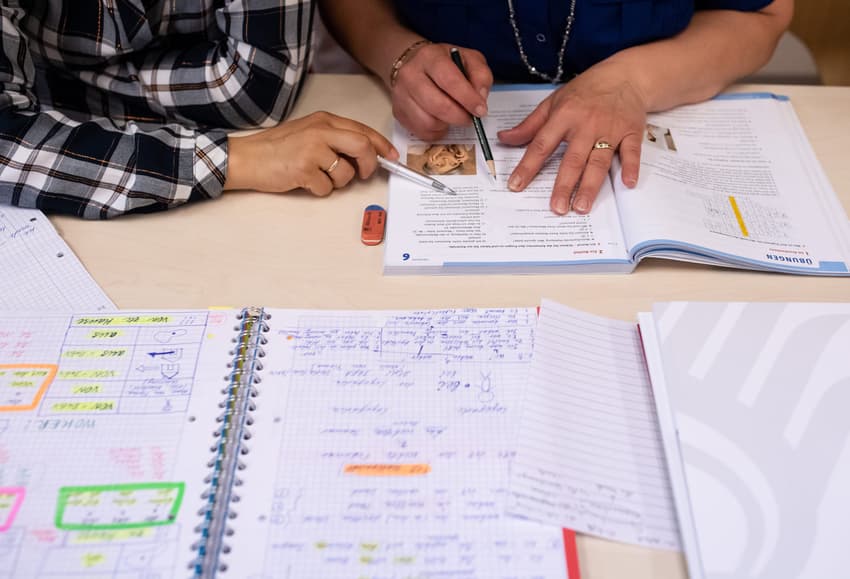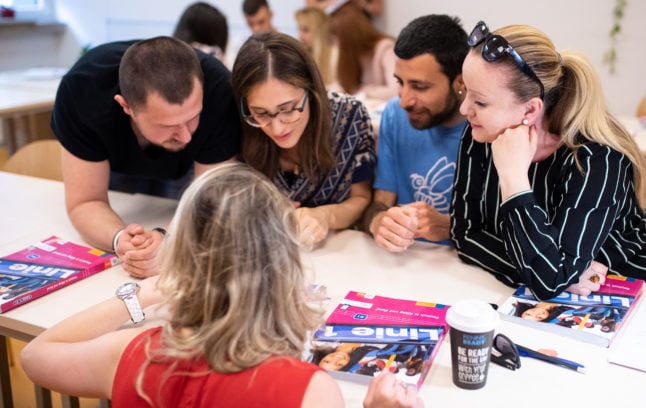EXPLAINED: How to pick the right German language school for you

From the Goethe Institute to online tutors, there are countless ways to learn German. Here's how to navigate all the different types of language school and pick one that suits your needs.
If you're hoping to brush up on your German, or even start learning it for the first time, you may be wondering exactly where to start.
Whether it's the countless language-learning apps or dedicated schools subsidised by the German government, there are a huge number of options for getting to grips with your der, die and das. But how do you decide which one is best for you?
Here are some of the different types of language schools you might encounter in Germany and the key things to know about each of them.
Private tutors
Private language tutors are self-employed teachers that offer tuition to individuals or small groups. These are often native speakers of German who are qualified and experienced in language teaching.
Unlike normal language courses, working with a private tutor tends to be a lot more flexible and based around the student's goals and needs. For example, if you're working towards your B1 exam for citizenship and simply need to know you can pass, a private tutor might help you with your exam prep one-on-one.
READ ALSO: Which countries in Europe impose language tests for residency permits?
These days, there are plenty of ways to find a tutor to help you learn German both online and in-person. Online platforms like Italki and Verbling are a few examples of places to search for a German tutor online, but you can also find listings on websites like Craigslist or Ebay Kleinanzeigen, and also on local Facebook groups.
Generally, one-on-one tuition is a fair bit more expensive than a group language course, with most tutors costing between €30 and €55 per hour. But the amount of competition online has meant that you can still get good deals if you look for them.
You can also use platforms like Italki to look for what's know as a "Community Tutor" - a native speaker who isn't a qualified teacher but can still help you with your German. This tends to be a more affordable option than working with a professional.
Right for you if... you're looking for flexibility and a more personalised approach to learning German.
Not for you if... you want to learn German on a tight budget.
Private language schools

Internationals take part in a German integration course at a language school in Munich. Photo: picture alliance/dpa | Sven Hoppe
Private language schools are probably one of the most popular choices for foreigners who want to learn German - and there are some good reasons for that. Especially in international hubs like Berlin and Frankfurt, expats are spoiled for choice. These schools usually offer a range of courses from intensive (fast-track) language courses to evening classes, as well as specialised courses like exam preparation, integration courses and Business German.
Most language schools run their courses in relatively small groups of 5-10 people, which makes it easy to get to know your fellow students. You can also find private tutors there that can offer one-on-one classes, though these will obviously be more expensive. Depending on where you live and which school you pick, a four-week intensive group course at private school will generally set you back between €300 and €600.
Right for you if... you enjoy working in small groups in a laid-back atmosphere.
Not for you if... you don't have much time to dedicate to learning German right now or prefer a less structured approach.
READ ALSO: Are these the best German cities to learn a foreign language?
Goethe Institute
Named after Germany's most famous writer and thinker, the Goethe Institute is a non-profit dedicated to promoting German language and culture all over the world. Like private language schools, they offer a wide range of course options between levels A1 and C2 as well as Business German and exam preparation.
Since the pandemic, the Goethe Institute has been running a lot of courses online as well as at their brick-and-mortar schools in places like Dresden, Freiburg and Berlin. Though their courses do tend to be comparatively pricey, studying there can be quite a special experience. That's because they have great language learning facilities on-site and also offer a rich social and cultural programme for students visiting from abroad.
A three-week intensive course at the Goethe Institute costs around €850, while in-person evening and weekend courses are around €750.
Right for you if... you want to study at the most famous German language institute around.
Not for you if... you're looking for the most affordable option.
Volkshochschule

A teacher writes on the chalk board during a language lesson. Photo: picture alliance/dpa | Sebastian Gollnow
Germany's Volkshochschulen (VHS) are essentially community colleges that offer heavily subsidised courses for adults. Most of them were founded right after the end of the First World War in 1918 to make learning more accessible to the general population, and thankfully they are still thriving to this day.
Whether it's Japanese cookery or basic IT skills, you're bound to find a course on it at the Volkshochschule - and, yes, they also teach German.
If you live in any relatively large town or city, you can find German courses and integration courses at your nearest Volkshochschule for bargain prices. Usually these are geared at working adults so classes tend to take place on at least one or two evenings in the week.
Class sizes tend to be a little larger than at the private language schools, but this is sometimes offset by the fact that, with such low prices, a lot of students simply don't turn up. You'll also likely find that courses for the higher levels (C1/C2) tend to have fewer students than the lower ones (A1/A2).
To complete a full language level at a Volkshochschule (24 classes), you can expect to pay around €200-250. Shorter courses cost around €40-50.
Right for you if... you're looking for a cheap option and a way to get to know people in your local area.
Not for you if... you don't want to give up too many of your weeknights and don't like larger groups.
READ ALSO: The best ways to improve your German for free
Online language courses:

A man logs onto an online language class at home. Photo: picture alliance/dpa/Acer Computer GmbH | Acer Deutschland
Since the pandemic, many language schools have started offering both in-person and remote options for their courses. But there are also online platforms that offer group classes in a slightly less structured way.
A few examples of these are Babbel Live, which is linked to the language-learning app of the same name, and Lingoda - though new ones are springing up all the time. These tend to differ from traditional language courses by allowing learners to pick and choose which modules they take and which classes they join.
READ ALSO: EXPLAINED: What to know about languages and dialects in Germany
They're often run in a kind of subscription model where you pay for a certain amount of class credits a month and book a class as and when you want to. Lingoda also runs language challenges known as marathons, where you can get your tuition for free or at a discount if you manage to attend a certain amount of classes per month for a certain amount of time. Beware, though, you do need to be especially dedicated and organised to nab the discount.
Class sizes tend to be restricted to 4-6 participants, depending on the platform. Prices vary but you can expect to pay between €50 and €90 per month for a subscription.
Right for you if... you don't want to spend time travelling to class and want classes to fit around your schedule.
Not for you if... you enjoy in-person learning and need a more structured course to reach your goals.
What are my other options?
Of course, the above options are nowhere near an exhaustive list of what's out there. If you're a student at a German university, there may be cheap courses available there, and there are also many options for self-directed learning.
Apps can be a helpful way to pick up some extra vocabulary while on the go, though they aren't really a substitute for a proper language course.
Some other options for self-directed learning include:
- Finding a tandem partner to practice with
- Self-study courses like the Michel Thomas method, Pimsleur and Teach Yourself
- Coursebooks like TELC, Aspekte Neu and Sicher
- Free exercises and lessons on websites like DeutschAkademie and the Goethe Institute
Of course, if you're really stumped by the options, there's no harm in mixing and matching - for example, by taking a group course and booking a few private lessons to consolidate your knowledge. In fact, that may well be the perfect recipe for success.
Viel Glück! (Good luck!)
READ ALSO: From Moin to Tach – How to say hello around Germany
Comments
See Also
If you're hoping to brush up on your German, or even start learning it for the first time, you may be wondering exactly where to start.
Whether it's the countless language-learning apps or dedicated schools subsidised by the German government, there are a huge number of options for getting to grips with your der, die and das. But how do you decide which one is best for you?
Here are some of the different types of language schools you might encounter in Germany and the key things to know about each of them.
Private tutors
Private language tutors are self-employed teachers that offer tuition to individuals or small groups. These are often native speakers of German who are qualified and experienced in language teaching.
Unlike normal language courses, working with a private tutor tends to be a lot more flexible and based around the student's goals and needs. For example, if you're working towards your B1 exam for citizenship and simply need to know you can pass, a private tutor might help you with your exam prep one-on-one.
READ ALSO: Which countries in Europe impose language tests for residency permits?
These days, there are plenty of ways to find a tutor to help you learn German both online and in-person. Online platforms like Italki and Verbling are a few examples of places to search for a German tutor online, but you can also find listings on websites like Craigslist or Ebay Kleinanzeigen, and also on local Facebook groups.
Generally, one-on-one tuition is a fair bit more expensive than a group language course, with most tutors costing between €30 and €55 per hour. But the amount of competition online has meant that you can still get good deals if you look for them.
You can also use platforms like Italki to look for what's know as a "Community Tutor" - a native speaker who isn't a qualified teacher but can still help you with your German. This tends to be a more affordable option than working with a professional.
Right for you if... you're looking for flexibility and a more personalised approach to learning German.
Not for you if... you want to learn German on a tight budget.
Private language schools

Private language schools are probably one of the most popular choices for foreigners who want to learn German - and there are some good reasons for that. Especially in international hubs like Berlin and Frankfurt, expats are spoiled for choice. These schools usually offer a range of courses from intensive (fast-track) language courses to evening classes, as well as specialised courses like exam preparation, integration courses and Business German.
Most language schools run their courses in relatively small groups of 5-10 people, which makes it easy to get to know your fellow students. You can also find private tutors there that can offer one-on-one classes, though these will obviously be more expensive. Depending on where you live and which school you pick, a four-week intensive group course at private school will generally set you back between €300 and €600.
Right for you if... you enjoy working in small groups in a laid-back atmosphere.
Not for you if... you don't have much time to dedicate to learning German right now or prefer a less structured approach.
READ ALSO: Are these the best German cities to learn a foreign language?
Goethe Institute
Named after Germany's most famous writer and thinker, the Goethe Institute is a non-profit dedicated to promoting German language and culture all over the world. Like private language schools, they offer a wide range of course options between levels A1 and C2 as well as Business German and exam preparation.
Since the pandemic, the Goethe Institute has been running a lot of courses online as well as at their brick-and-mortar schools in places like Dresden, Freiburg and Berlin. Though their courses do tend to be comparatively pricey, studying there can be quite a special experience. That's because they have great language learning facilities on-site and also offer a rich social and cultural programme for students visiting from abroad.
A three-week intensive course at the Goethe Institute costs around €850, while in-person evening and weekend courses are around €750.
Right for you if... you want to study at the most famous German language institute around.
Not for you if... you're looking for the most affordable option.
Volkshochschule

Germany's Volkshochschulen (VHS) are essentially community colleges that offer heavily subsidised courses for adults. Most of them were founded right after the end of the First World War in 1918 to make learning more accessible to the general population, and thankfully they are still thriving to this day.
Whether it's Japanese cookery or basic IT skills, you're bound to find a course on it at the Volkshochschule - and, yes, they also teach German.
If you live in any relatively large town or city, you can find German courses and integration courses at your nearest Volkshochschule for bargain prices. Usually these are geared at working adults so classes tend to take place on at least one or two evenings in the week.
Class sizes tend to be a little larger than at the private language schools, but this is sometimes offset by the fact that, with such low prices, a lot of students simply don't turn up. You'll also likely find that courses for the higher levels (C1/C2) tend to have fewer students than the lower ones (A1/A2).
To complete a full language level at a Volkshochschule (24 classes), you can expect to pay around €200-250. Shorter courses cost around €40-50.
Right for you if... you're looking for a cheap option and a way to get to know people in your local area.
Not for you if... you don't want to give up too many of your weeknights and don't like larger groups.
READ ALSO: The best ways to improve your German for free
Online language courses:

Since the pandemic, many language schools have started offering both in-person and remote options for their courses. But there are also online platforms that offer group classes in a slightly less structured way.
A few examples of these are Babbel Live, which is linked to the language-learning app of the same name, and Lingoda - though new ones are springing up all the time. These tend to differ from traditional language courses by allowing learners to pick and choose which modules they take and which classes they join.
READ ALSO: EXPLAINED: What to know about languages and dialects in Germany
They're often run in a kind of subscription model where you pay for a certain amount of class credits a month and book a class as and when you want to. Lingoda also runs language challenges known as marathons, where you can get your tuition for free or at a discount if you manage to attend a certain amount of classes per month for a certain amount of time. Beware, though, you do need to be especially dedicated and organised to nab the discount.
Class sizes tend to be restricted to 4-6 participants, depending on the platform. Prices vary but you can expect to pay between €50 and €90 per month for a subscription.
Right for you if... you don't want to spend time travelling to class and want classes to fit around your schedule.
Not for you if... you enjoy in-person learning and need a more structured course to reach your goals.
What are my other options?
Of course, the above options are nowhere near an exhaustive list of what's out there. If you're a student at a German university, there may be cheap courses available there, and there are also many options for self-directed learning.
Apps can be a helpful way to pick up some extra vocabulary while on the go, though they aren't really a substitute for a proper language course.
Some other options for self-directed learning include:
- Finding a tandem partner to practice with
- Self-study courses like the Michel Thomas method, Pimsleur and Teach Yourself
- Coursebooks like TELC, Aspekte Neu and Sicher
- Free exercises and lessons on websites like DeutschAkademie and the Goethe Institute
Of course, if you're really stumped by the options, there's no harm in mixing and matching - for example, by taking a group course and booking a few private lessons to consolidate your knowledge. In fact, that may well be the perfect recipe for success.
Viel Glück! (Good luck!)
READ ALSO: From Moin to Tach – How to say hello around Germany
Join the conversation in our comments section below. Share your own views and experience and if you have a question or suggestion for our journalists then email us at [email protected].
Please keep comments civil, constructive and on topic – and make sure to read our terms of use before getting involved.
Please log in here to leave a comment.